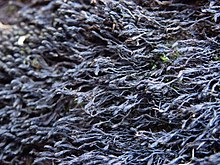| Icy rockmoss | |
|---|---|

| |
| Conservation status | |
 Vulnerable (IUCN 3.1) | |
| Scientific classification | |
| Kingdom: | Plantae |
| Division: | Bryophyta |
| Subdivision: | Andreaeophytina |
| Class: | Andreaeopsida |
| Order: | Andreaeales |
| Family: | Andreaeaceae |
| Genus: | Andreaea |
| Species: | A. frigida |
| Binomial name | |
| Andreaea frigida Huebener | |
| Synonyms | |
| |
Andreaea frigida, commonly known as icy rock moss, is a species of moss endemic to Europe.
Distribution and habitat
Endemic to the mountains of Europe between 37 degrees north and 67 degrees north, A. frigida can be found in Andorra, Austria, Belgium, the Czech Republic, France (mainland France and Corsica), Germany, Hungary, Italy, Luxembourg, Monaco, the Netherlands, Norway, Poland, Portugal, Romania, Slovakia, Spain, Switzerland, Ukraine, and the United Kingdom. It grows in humid, rocky areas in alpine or subalpine habitats at altitudes of 385–2,800 m (1,263–9,186 ft) above sea level.
In the UK its occurrence is widespread in the Cairngorms National Park, where it is typically found on rocks in burns fed by snow patches, but it is not found elsewhere except at a single site in the Lake District of England.
The earliest records for the UK date to 1854, (although its existence was not formally recognised until 1988), and it is classified as "Vulnerable". The greatest threat to its continuing existence is assumed to be global warming.
See also
- Endemic Scottish moss species:
- Flora of Scotland
References
- ^ Schnyder, N. (2019). "Andreaea frigida". IUCN Red List of Threatened Species. 2019: e.T83659796A87732467. doi:10.2305/IUCN.UK.2019-2.RLTS.T83659796A87732467.en. Retrieved 1 June 2024.
- "Andreaea frigida Huebener". World Flora Online. Retrieved 1 June 2024.
- Murray, B. M. (1992). Hill, M. O.; Preston, C. D.; Smith, A. J. E. (eds.). Atlas of the Bryophytes of Britain and Ireland. Vol. 2. Mosses (except Diplolepideae). Harley Books. p. 60. ISBN 0 946589 30 5.
- Rothero, Gordon "Bryophytes", in Shaw, Philip and Thompson, Des (eds.) (2006) The Nature of the Cairngorms: Diversity in a changing environment. Edinburgh. The Stationery Office. ISBN 0-11-497326-1. p. 200.
- "Snow beds – Scotland’s Arctic" Archived 2010-11-14 at the Wayback Machine SNH. Retrieved 10 June 2008.
- "Species Action Plan: Icy Rock Moss (Andreaea frigida)" Archived November 7, 2007, at the Wayback Machine UK Biodiversity Action Plan. Retrieved 10 June 2008.
| Taxon identifiers | |
|---|---|
| Andreaea frigida | |
This moss-related article is a stub. You can help Misplaced Pages by expanding it. |